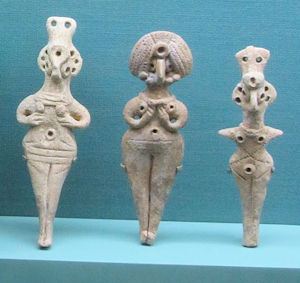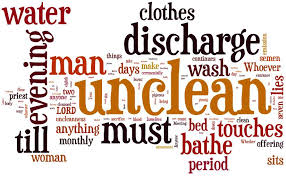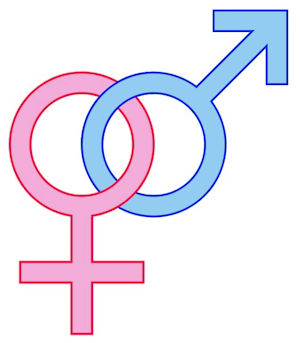There have been more than just a handful of times when I received questions from women about that “monthly curse” of menstruation. Most questions revolved around the issues of being unclean or ‘dirty’, as pointed out in the Bible. For example, someone would ask, “How can I feel good about myself, if God tells me that I’m so unclean during my period, that everyone and everything I touch, or touches me, is contaminated, too.”
This does sound like a rather unkind attitude, and all the harsh details about it are in the Bible book of Leviticus. Many people think Leviticus is rather boring, but there are plenty of areas that are informative, as well as puzzling. If you have never read the laws concerning bodily discharges, you will probably be bewildered — read Leviticus chapter 15.
It is interesting to know how women and men had to follow strict rules in the Old Testament days, but by the end of this article, you will understand why all those pre-Christian laws don’t apply anymore. So, the lady that asked that question, need not have worried.
Another essay concerning this subject had previously been published by The Outlaw Bible Student. It is specific to some events in Genesis and you can find it listed in References & Notes at the end of this article.1 This discourse, however, will deal with different facts, references, and explanations, as well as examining a couple of related Bible stories.
A true story comes to mind.
I once read an article in the International Business Times about one woman’s opinion that the Judeo-Christian religions were hateful to women. It seemed to me that her biggest problem was the curse of a menstrual period, for which she blamed God. God’s creation of a woman, she thought, was only an afterthought to appease Adam’s displeasure of being alone. God gave him a toy, so to speak, to keep him entertained, as well as stop his complaining.
She was raised as a Christian and actually wrote, “Even as a little girl I resented that and could hear how laced with agenda that story was. Man is divine but woman is some science experiment that God acquiesced to? This story has been propped up so often by those who seek to legitimize misogyny,2 by citing that the very invention of [a] woman, is evidence of how flawed and distant from God we must be.
 “Why do we find the disavowal of women on their menses across religious traditions?” she goes on to write. “Further, it suggests that man and God are in concert with each other in reminding women that they are less valuable, less useful, and certainly less significant . . . Women are evidence of a curse.” She continued, “I know I am supposed to acquiesce to the idea that bleeding every month makes me less holy, less worthy of heaven, but how could I ever align myself with that? . . .”3
“Why do we find the disavowal of women on their menses across religious traditions?” she goes on to write. “Further, it suggests that man and God are in concert with each other in reminding women that they are less valuable, less useful, and certainly less significant . . . Women are evidence of a curse.” She continued, “I know I am supposed to acquiesce to the idea that bleeding every month makes me less holy, less worthy of heaven, but how could I ever align myself with that? . . .”3
This attitude is not all that uncommon in today’s world, especially among those who classify themselves as feminists. In many areas — and yes, in many Christian denominations, too — men are dominant in leadership and treat women as less than equal. But that is not God’s way, it is caused by sin; blame humans, if you wish, but don’t blame God, because he cursed neither Adam, nor Eve. He only explained how the error of their sin would change their lives. God does have an agenda, but it has nothing to do with keeping women suppressed; his agenda is to bring humankind back to a perfect pre sinful condition.
Historically, there had been inequality of the sexes, but when Jesus came along, he taught differently and treated both male and female equally. He saw them as persons — not just men and women. “He did not perceive them primarily in terms of their sex, age, or marital status; he seems to have considered them in terms of their relation (or lack of one) to God.”4
Not only did that lady writer get God’s creation story wrong, she also implied that God made the menstrual cycle as a horrible punishment on purpose, as a vindictive act. Does she even understand the science behind the menstruation process she complains about? Don’t get me wrong. I do feel bad that she and others have this anger or psychological pain, in addition to the common recurring monthly discomfort. But serious investigation of scripture about God’s reasons can shed some light and eliminate some mental suffering.
 The Bible specifically mentions this monthly period of the female, but as we will see, the strict biblical rules concerning bodily discharges applied to men as well as women. And any inequality in application is only illusional.
The Bible specifically mentions this monthly period of the female, but as we will see, the strict biblical rules concerning bodily discharges applied to men as well as women. And any inequality in application is only illusional.
Originally, in the Garden of Eden, the ‘Adam’5 was a creature that became known by that name only later. This creature was a single individual that had both male and female attributes. God created Eve by removing half of the Adam’s personality and crafting it into a new body with its own unique physiology — a bit of Godly genetic engineering. Hence, when married they become one, each half joining to make one whole unit. We were both created as equal with different functions that worked well together.
One author stated it this way, “They both had the same nature. But what man lacked . . . she supplied, and what she lacked he supplied. The culmination was one flesh — the complete unity of man and woman in marriage.”6 Details of this process have been published in a previous article titled “Did God Really Make Eve from Adam’s Rib?” and it is also listed in the References & Notes at the end of this article.7
Emission of semen and menstrual discharges.
Yahweh told Moses (and his brother Aaron) to speak with the people of Israel and tell them the social (or civic) laws about bodily discharges for both men and women. All are contained in the Old Testament in the book of Leviticus. Laws for men are first and can be read at Leviticus 15:2–18.
Remember that the ancients had only mediocre medical knowledge, so we must understand the primitive culture at that time. It was easier for God to provide direction about hygiene, rather than teach biology, which could not have been completely understood. So, there are good medical reasons behind the implementation of his laws.
Here are the highlights of those rules for men. The man is defiled by his discharge, as well as any bed, or anything on which he sits. If you touch him or any of those things, or sit where he sat, you must wash your clothes and bathe yourself, and remain unclean until evening. Likewise, if he touches you without first rinsing his hands. Depending upon the type and reason for the discharge, he can remain impure for up to seven days.

When a man has an emission of semen, he must bathe his entire body in water and will remain unclean until the next evening. Any clothing must be washed. After a man and a woman have sexual intercourse, they must each bathe in water and remain unclean until the next evening.
Now, for women, the laws can be read at Leviticus 15:19–30. When a woman has her menstrual period, she will be unclean for seven days. Anyone who touches her will be unclean until evening. Anything on which she sits or lies will be unclean, as well as anyone who touches those things. If you do touch those things, you must wash your clothes and bathe in water, and remain unclean until evening.
If a man has sexual intercourse with a woman, or if her blood touches him, he will remain unclean for seven days and any bed he lies upon will be unclean. If a woman has a discharge of blood beyond the normal period, she is unclean as long as the discharge continues.
These are the basic rules, but further details are given, in Leviticus 15. So it is not just the woman who is unclean, but also the man. At that time, it was thought that uterine blood was the female seed, analogous to male semen. They weren’t able to correlate female orgasm, conception, and menstruation, but it was their best logical model at that time. This suggestion was believed true enough to be explained in ancient Greek and Latin texts. They figured that since females menstruate only when not pregnant, then menstrual blood must be the female contribution to conception.8
What does unclean mean?
When the Bible uses the word ‘unclean’, it does not always mean ‘dirty’ or ‘contaminated’, but sometimes means ‘ceremonially or spiritually impure’, as in being separated from the presence of God. This is the “loss of spiritual power that comes from being distanced from God and being able to die, both physically and spiritually.” This is exactly “what Adam and Eve brought into the world when they took of the fruit of the Tree of Good and Evil.”9
 Concerning sexual relations, there is nothing sinful or dirty about that activity. It was the fluids (semen or blood) leaving the bodies that were the cause of impurity, not the actions of the husband and wife.10
Concerning sexual relations, there is nothing sinful or dirty about that activity. It was the fluids (semen or blood) leaving the bodies that were the cause of impurity, not the actions of the husband and wife.10
But there is one other law, one that not everyone knows about, tucked away in chapter 18. “Do not have sexual relations with a woman during her period of menstrual impurity.” (Leviticus 18:19, NLT).11 One academic suggested this one prohibition was because it was a Canaanite practice and the Israelites were not to emulate their customs.12
But what if it happened by accident — what if her period unknowingly came early. Well, another author13 suggests that if this were to happen by accident, it would be covered under Leviticus 15:24. “If a man has sexual intercourse with her and her blood touches him, her menstrual impurity will be transmitted to him. He will remain unclean for seven days, and any bed on which he lies will be unclean.”
Some people will still say that the length of time necessary for women to go through the purification process is a bit unequal compared to men, but keep in mind of the physical differences between the sexes. And a further consideration, which I have never seen another author address, is that of sexual self-stimulation. Because of the way the law was written, every time a man masturbated to climax, even while alone, he had to wash his clothes and bedding, and bathe, and remain unclean until evening, whereas there was no such rule that could be applied for women.
In the Old Testament: Rachel’s Menstruation Saves the Day

There is an interesting little story concerning Jacob and his wife Rachel, in the book of Genesis. After many years they decide to leave the home area of Rachel’s father, because Jacob wanted to return to his own family. Before leaving on their journey, Rachel (feeling justified doing so) secretly takes her father’s household gods14 and did not tell Jacob what she had done. When her father, Laban, discovers they are missing, he catches up with their traveling caravan and searches through their belongings. Jacob tells his father-in-law that he did not steal them.
“. . . if you can find them . . . let the person who has taken them die! And if you find anything else that belongs to you, identify it before all these relatives of ours, and I will give it back!”
“Laban went first into Jacob’s tent to search there, then into Leah’s, and then the tents of the two servant wives—but he found nothing. Finally, he went into Rachel’s tent. But Rachel had taken the household idols and hidden them in her camel saddle, and now she was sitting on them.
When Laban had thoroughly searched her tent without finding them, she said to her father, “Please, sir, forgive me if I don’t get up for you. I’m having my monthly period.” So Laban continued his search, but he could not find the household idols.” (Genesis 31:31b-35).
In the New Testament: Chronic Menstrual Bleeding Cured by Jesus
Once, while Jesus was healing the sick, there was a woman who had been suffering with constant bleeding for twelve years. She had been treated by many physicians, but nothing solved her medical problem; her finances had run out and her condition had gotten worse.
She had heard about Jesus, so she came up behind him through the crowd and touched his robe. For she thought to herself, “If I can just touch his robe, I will be healed.” Immediately the bleeding stopped, and she could feel in her body that she had been healed of her terrible condition.
Jesus realized at once that healing power had gone out from him, so he turned around in the crowd and asked, “Who touched my robe?” His disciples said to him, “Look at this crowd pressing around you. How can you ask, ‘Who touched me?’ ”
But he kept on looking around to see who had done it. Then the frightened woman, trembling at the realization of what had happened to her, came and fell to her knees in front of him and told him what she had done. And he said to her, “Daughter, your faith has made you well. Go in peace. Your suffering is over.” (Mark 5:27-34).

This woman was trembling with fear, because of having done an unconscionable thing. “She had approached a holy person willfully, knowingly, and in the flood of her impurity. According to the rules of purity, she had just rendered Jesus unclean. She had been exposed in public in the middle of this shameful, embarrassing, and defiling act.” But instead of humiliating her for violating a ritual restriction, Jesus approached her directly and is compassionate and speaks to her pleasantly.15
This bleeding problem, which she suffered, is sometimes inaccurately called a hemorrhage in some Bible translations. A professor, in the School of Medicine at Washington University in St. Louis, states that the Greek words used, in this biblical passage, are in reference to a steady ooze of menstrual bleeding. She had what gynecologists call ‘menometrorrhagia’, or heavy, irregular, and unpredictable menstrual periods.16
There were good reasons for the laws.
The ritual uncleanness of a woman’s menstrual period had two purposes. It kept the messiness more contained by restraining activities. And the absence of sexual relations for a while was a built-in ‘anticipation builder’ for both husband and wife, for what is sometimes known as ‘reunion sex’17 or, as some Jews call it, the monthly honeymoon.
To a modern woman, these regulations seem impractical, but back then these rules created a time of rest away from male members of family and community. This practice also meant that sexual intercourse only took place at a time in the monthly cycle when she was most likely to conceive.18
 We now know, because of advances in medical education, the wisdom displayed in God’s laws. Blood and bodily fluids, like semen and vaginal secretions, can be contaminated with diseases and capable of transmitting hepatitis B virus (HBV), hepatitis C virus (HCV), and human immunodeficiency virus (HIV).19
We now know, because of advances in medical education, the wisdom displayed in God’s laws. Blood and bodily fluids, like semen and vaginal secretions, can be contaminated with diseases and capable of transmitting hepatitis B virus (HBV), hepatitis C virus (HCV), and human immunodeficiency virus (HIV).19
“The explicit reason for the prohibition of sex during a woman’s period was to avoid exposing the source of her flow of blood by sexual contact. Intercourse would open what should remain closed during that time.” And it makes perfect gynecological sense, because besides the viruses already mentioned, there can be some sexually transmitted diseases causing pelvic inflammatory disease (PID).20
As one author stated, “Now imagine what it would be like living within a large community in the wilderness, like Israel was on their way to the promised land, and no one practiced hygiene to avoid spreading high risk bodily fluids? If one person had an illness and people were not careful, the risk of spreading an illness and causing a major outbreak among many people would have been huge.”21 These rules, in effect at that time, helped protect God’s chosen people.
Does all this matter today?
Those laws don’t much matter, today, because Jesus did away with the Mosaic laws (social or civic laws) of the Old Testament; they are not commanded of Christians. (This does not, of course, include God’s original Ten Commandments.) The Apostle Paul wrote, “For Christ himself has brought peace to us. He united Jews and Gentiles into one people when, in his own body on the cross, he broke down the wall of hostility that separated us. He did this by ending the system of law with its commandments and regulations. He made peace between Jews and Gentiles by creating in himself one new people from the two groups.” (Ephesians 2:14-15).
 Jesus established a new law. He said, “I give you a new commandment, that you love one another. Just as I have loved you, you also should love one another. By this everyone will know that you are my disciples, if you have love for one another.” (John 13:34-35).
Jesus established a new law. He said, “I give you a new commandment, that you love one another. Just as I have loved you, you also should love one another. By this everyone will know that you are my disciples, if you have love for one another.” (John 13:34-35).
Today we have running water and we practice proven methods of hygiene. We know the biological basics of bodily fluids and how to protect ourselves from diseases. We have high-tech hospitals and educated physicians available if needed, so Christians don’t need to follow the Old Testament rules concerning bodily discharges. But, if we love one another, we will take our spouse’s needs and feelings into account, concerning our bodies and its comforts or discomforts.
There are some populations that still follow many Old Testament purity laws. Followers of traditional or Orthodox Judaism, of course, as well as many Liberal Jews and Messianic Jews that do so, by choice. But also some few Christians who, although not commanded to do so, don’t want to forget the Jewish foundations of Christendom.
Take the tradition of using the mikvah (ritual immersion bath) for instance, to achieve ritual purity, especially after a woman’s monthly cycle. This ritual cleansing bath can bring both husband and wife closer to God and heighten their spirituality. It can be a monthly experience that includes prayer and renewed faith — a new start, as we say.
Now, there are many options for women who want some sort of control over their monthly annoyance, they can now choose to regulate or suppress their periods using either short acting contraceptives like pills or rings or a long-acting method like an IUD22 or injections — or those periods can now even be completely eliminated. When given the choice, more than 60 percent of women will decide to control their periods to some extent.23
I’ve gotten in the habit of trying to find a song or other video related to the subject of my articles (most times, anyway). So, what kind of song goes with the subject of ‘that time of month’ for women? Well, I have one. It’s called “The Period Song” and selected lyrics are below. A link to this clever music video is listed in References & Notes.24
 It’s that time of the month, when you get the hump,
It’s that time of the month, when you get the hump,
because something’s on its way.
Your mood starts to drop and you feel really hot,
you feel tired and vile all day.
Your boobs don’t feel right, you don’t sleep well at night,
and you cry for no reason at all.
‘Cause this cyclical hell that makes women unwell,
is back to make you bawl!
![]()
Copyright © 2020, Dr. Ray Hermann
OutlawBibleStudent.org
→ Leave comments at the end, after ‘References & Notes’.
You can see our basic rules for comments by clicking “The Fine Print” on the top menu bar.
References & Notes
- Hermann, Ray, “That Monthly Period of Women: Did God Curse Eve?” (The Outlaw Bible Student, OBS, 16 December 2018), https://outlawbiblestudent.org/that-monthly-period-of-women-did-god-curse-eve/
- misogyny (n), misogynous (adj): refers specifically to a hatred of women.
Merriam-Webster’s Collegiate Dictionary, 11th ed., (Springfield, MA: Merriam-Webster, Inc., 2003). - Christina, Dominique, “The great religious taboo: Why are girls taught that periods are God’s curse?” (International Business Times, IBT, 16 January 2017), https://www.ibtimes.co.uk/great-religious-taboo-why-are-girls-taught-that-periods-are-gods-curse-1581542
- Hurley, James B., Man and Woman in Biblical Perspective, (Grand Rapids, MI: Zondervan Publishing House, 1981), p. 83.
- אָדָם : (Hebrew) 1. a man = human being; = any one; 2. collectively man, mankind; distinctly = men + women.
Whitaker, Richard, et al., The Abridged Brown-Driver-Briggs Hebrew-English Lexicon of the Old Testament: From A Hebrew and English Lexicon of the Old Testament by Francis Brown, S.R. Driver and Charles Briggs, Based on the Lexicon of Wilhelm Gesenius, (Boston; New York: Houghton, Mifflin and Company, 1906). - Ross, Allen P., “Genesis,” in The Bible Knowledge Commentary: An Exposition of the Scriptures, J. F. Walvoord and R. B. Zuck, (Eds.), (Wheaton, IL: Victor Books, 1985), vol. 1, p. 31.
- Hermann, Ray, “Did God Really Make Eve from Adam’s Rib?” (The Outlaw Bible Student, OBS, 23 December 2018), https://outlawbiblestudent.org/did-god-really-make-eve-from-adams-rib/
- Meacham, Tirzah, “Female Purity (Niddah)”, (Jewish Women’s Archive Encyclopedia, retrieved 2 March 2020), https://jwa.org/encyclopedia/article/female-purity-niddah
- Farrell, Heather, “What Does it Mean for a Woman to be ‘Unclean’ in the Bible?” (Women in the Scriptures, 15 February 2016), http://www.womeninthescriptures.com/2016/02/what-does-it-mean-for-woman-to-be.html
- Mowczko, Marg, “Periods of Purification after Childbirth (Leviticus 12:1-8)”, (Marg Mowczko Blog, 18 December 2018), https://margmowczko.com/purification-after-giving-birth-leviticus-12/#_ftn6
- All Scripture quotations are taken from the Holy Bible, New Living Translation (NLT), ©2007 by Tyndale House Foundation. Used by permission of Tyndale House Publishers, Inc., Carol Stream, Illinois 60188. All rights reserved.
- Barry, John D., et al., Faithlife Study Bible, (Bellingham, WA: Lexham Press, 2016), Leviticus 18:19.
- Gane, Roy E., Old Testament Law for Christians: Original Context and Enduring Application, (Grand Rapids, MI: Baker Academic: A division of Baker Publishing Group, 2017), pp. 358–361.
- household gods: called teraphim; primitive Semitic house-gods; usually small carved statues or images in human shapes; the most important function was that it was used for divination.
Singer, Isidore, (Ed.), The Jewish Encyclopedia: A Descriptive Record of the History, Religion, Literature, and Customs of the Jewish People from the Earliest Times to the Present Day, (New York; London: Funk & Wagnalls, 1901-1906), vol. 12, p. 108. - Wall, L. Lewis, “Jesus and the Unclean Woman”, (Christianity Today Magazine, 13 January 2010), vol. 54, no. 1, p. 48.
- Ibid.
Note: L. Lewis Wall, was professor of obstetrics/gynecology in the School of Medicine and professor of anthropology in the College of Arts and Sciences at Washington University in St. Louis (at the time of his article in 2010). - Bohlin, Sue, “Why Were Women Unclean During Their Period in the Old Testament?” (Probe for Answers, 27 May 2005), https://probe.org/why-were-women-unclean-during-their-period-in-the-old-testament/
- Fletcher, Elizabeth, “The Bible woman with the issue of blood” (Women in the Bible, 2006), http://www.womeninthebible.net/women-bible-old-new-testaments/menstruating-woman/menstruating-womans-world/
- Bigg, Lee, “Why Are Women on Their Monthly Cycle Unclean”, (Shalom Adventure, retrieved 2 March 2020), https://www.shalomadventure.com/torah/articles/2976-why-are-women-on-their-monthly-cycle-unclean
- Gane, Roy E., Old Testament Law for Christians: Original Context and Enduring Application, (Grand Rapids, MI: Baker Academic: A division of Baker Publishing Group, 2017), pp. 358–361.
- Bigg, Lee, “Why Are Women on Their Monthly Cycle Unclean”, (see above).
- IUD: intrauterine device.
- Tarico, Valerie, “A Brief History of Your Period, and Why You Don’t Have to Have It,” (Jezebel, 23 July 2012), https://jezebel.com/5928316/a-brief-history-of-your-period-and-why-you-don’t-have-to-have-it
- “The Period Song”, Artist and author: Anna Shields; Performance by: Anna Shields and members of the Starling Arts team, UK, (recorded and mixed by Joe Davison at Auburn Jam Music, London, 2016), VIDEO: https://youtu.be/TXovBu6y8sQ


2 thoughts on “Menstrual Periods in the Bible and Other Personal Issues”